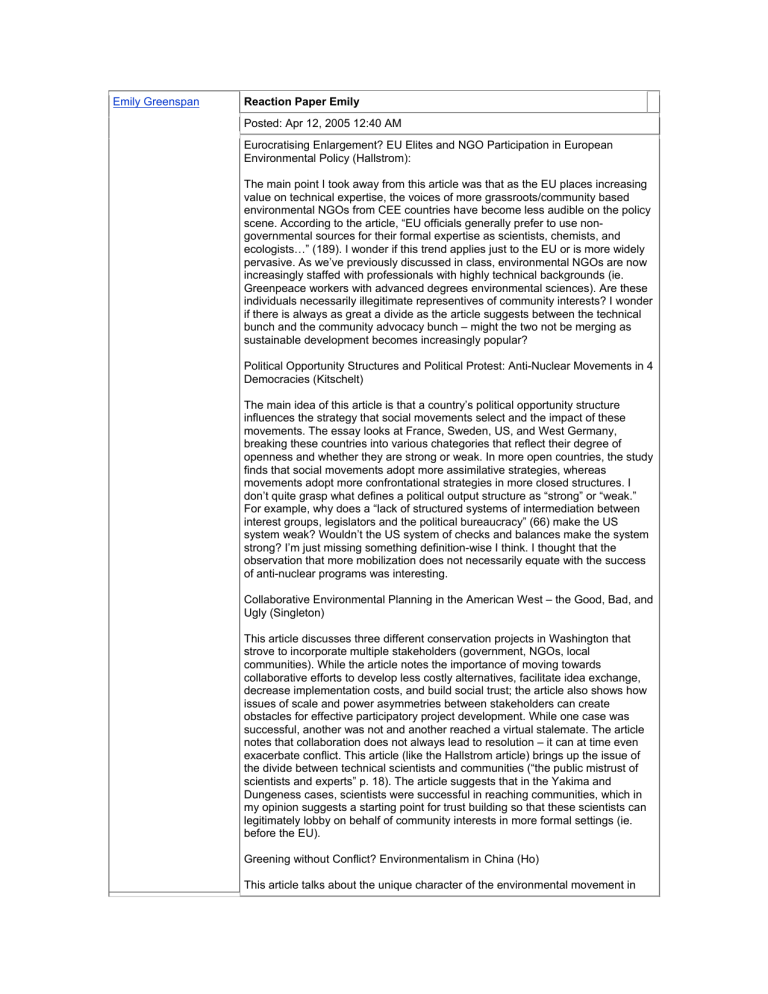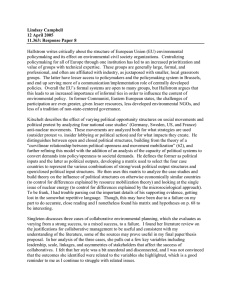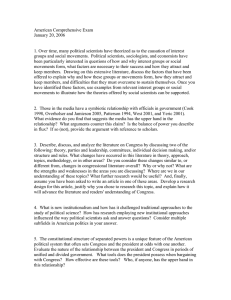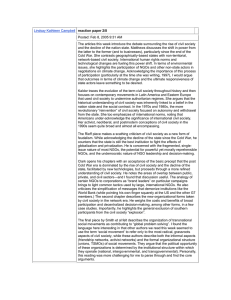Posted: Apr 12, 2005 12:40 AM Environmental Policy (Hallstrom): Reaction Paper Emily
advertisement

Emily Greenspan Reaction Paper Emily Posted: Apr 12, 2005 12:40 AM Eurocratising Enlargement? EU Elites and NGO Participation in European Environmental Policy (Hallstrom): The main point I took away from this article was that as the EU places increasing value on technical expertise, the voices of more grassroots/community based environmental NGOs from CEE countries have become less audible on the policy scene. According to the article, “EU officials generally prefer to use nongovernmental sources for their formal expertise as scientists, chemists, and ecologists…” (189). I wonder if this trend applies just to the EU or is more widely pervasive. As we’ve previously discussed in class, environmental NGOs are now increasingly staffed with professionals with highly technical backgrounds (ie. Greenpeace workers with advanced degrees environmental sciences). Are these individuals necessarily illegitimate representives of community interests? I wonder if there is always as great a divide as the article suggests between the technical bunch and the community advocacy bunch – might the two not be merging as sustainable development becomes increasingly popular? Political Opportunity Structures and Political Protest: Anti-Nuclear Movements in 4 Democracies (Kitschelt) The main idea of this article is that a country’s political opportunity structure influences the strategy that social movements select and the impact of these movements. The essay looks at France, Sweden, US, and West Germany, breaking these countries into various chategories that reflect their degree of openness and whether they are strong or weak. In more open countries, the study finds that social movements adopt more assimilative strategies, whereas movements adopt more confrontational strategies in more closed structures. I don’t quite grasp what defines a political output structure as “strong” or “weak.” For example, why does a “lack of structured systems of intermediation between interest groups, legislators and the political bureaucracy” (66) make the US system weak? Wouldn’t the US system of checks and balances make the system strong? I’m just missing something definition-wise I think. I thought that the observation that more mobilization does not necessarily equate with the success of anti-nuclear programs was interesting. Collaborative Environmental Planning in the American West – the Good, Bad, and Ugly (Singleton) This article discusses three different conservation projects in Washington that strove to incorporate multiple stakeholders (government, NGOs, local communities). While the article notes the importance of moving towards collaborative efforts to develop less costly alternatives, facilitate idea exchange, decrease implementation costs, and build social trust; the article also shows how issues of scale and power asymmetries between stakeholders can create obstacles for effective participatory project development. While one case was successful, another was not and another reached a virtual stalemate. The article notes that collaboration does not always lead to resolution – it can at time even exacerbate conflict. This article (like the Hallstrom article) brings up the issue of the divide between technical scientists and communities (“the public mistrust of scientists and experts” p. 18). The article suggests that in the Yakima and Dungeness cases, scientists were successful in reaching communities, which in my opinion suggests a starting point for trust building so that these scientists can legitimately lobby on behalf of community interests in more formal settings (ie. before the EU). Greening without Conflict? Environmentalism in China (Ho) This article talks about the unique character of the environmental movement in China, emphasizing the growth of the environmental movement, primarily through social organizations and local activities (though the national outcry to the Three Gorges Project is also discussed). The "green" movement arose as citizens expressed frustration with pollution and other environmental problems and the central government began to encourage the development of a stronger civil society to help respond to these challenges (p. 901). At the same time, in the late 90s the government began tightening regulations on the burgeoning civil society groups (ie. through 1998 regulations for the administration of social organizations). The article explores the push-and-pull that the Chinese government experiences as it both relies on civil society for development but at the same time works to keep the power of these groups in check.






